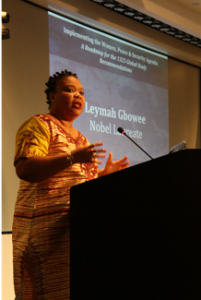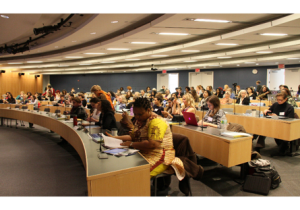By Marina Kumskova, an MA student in Human Rights
The 60th session of the Commission on the Status of Women (CSW60) took place at the United Nations Headquarters in New York this past March, with a view to highlight the link between women’s empowerment and sustainable development. Human rights activists, civil society organizations, and local leaders expressed their demand for a change in the current priorities of Member States, using the CSW60 as a platform to call for greater investment in women’s participation within peace processes, and a parallel divestment from militarism.
If safeguarding political economies of gender justice and peace are prioritized over economies of inequality and war, the outcomes of CSW60 will have a positive impact on the lives of women, men, girls, and boys around the world.

Demanding the stigmatization and elimination of militarization, as well as the creation of space for women’s participation in peace processes, various organizations and NGOs* hosted a symposium titled, “Implementing the Women, Peace & Security Agenda: A Roadmap for the 1325 Global Study Recommendations.” Notable female peace activists who attended included Radhika Coomaraswamy (author of the Global Study on the Implementation of Resolution 1325), Leymah Gbowee (Nobel Laureate), and Berta Zúñiga Cáceres (daughter of recently assassinated indigenous environmental activist and women’s rights defender Berta Cáceres).
Bringing together leading players, the symposium created space for civil society organizations to advance and strengthen plans for the United Nations, governments, and other key stakeholders to effectively implement the Women, Peace and Security (WPS) Agenda. Special attention was given to the structural conditions necessary for the creation of a lasting and sustainable peace.
As part of this symposium, activists gathered to mobilize around recommendations from the Global Study and develop more concrete steps in the following priority areas:
- Addressing Militarization and Violent Masculinities,
- Combating Violent Extremism,
- Supporting Women’s Human Rights Defenders and Peacebuilders,
- Adequate Financing for the Women, Peace, and Security Agenda,
- Participation in Peace & Reconstruction Processes.
The following presents the various conclusions of these circles as they relate to women, peace, security, and the implementation of the WPS agenda.
Addressing Militarization and Violent Masculinities
In this circle, the legacy of colonialism and the reality of structural inequalities were noted to have played a large role in propagating militarization, through the perpetuation of violent masculinities and the sidelining of women in society. The activists in this conversation circle felt these legacies were holding back the implementation of the WPS agenda, forcing a more lasting and sustainable peace to remain elusive. Although the UNSC Resolution 1325 was adopted almost sixteen years ago, serious concerns were voiced about the lack of political will on the part of States to increase women’s participation and rights in conflict. In this vein, the participants emphasized a strong need to develop adequate monitoring mechanisms in order to ensure women’s participation in the process of creating lasting and sustainable peace.
Preventing Violent Extremism
As acknowledged in this circle, different approaches to preventing violent extremism are available to those working both within and outside of religious traditions. Within religious communities creating space for diverse readings of traditions can expand dialogue and understanding, emphasizing the importance of strengthening common goals and collective power. Outside of a religious context, rights-based approaches that maintain agreed international standards are particularly important in advancing the WPS agenda. However, both approaches are jeopardized by the effects of the War on Terror, including heightened militarization worldwide. While addressing new emerging sources of violence is possible, the shrinkage of the world’s democratic space in the context of counter-terrorism does not allow for addressing the root causes of violence.
Supporting Women’s Human Rights Defenders and Peacebuilders:
In this conversation circle, participants noted that governments are pushing delivery of their international obligations to non-governmental organizations. While civil society members are critical stakeholders, they are ineffectively financed to address the structural conditions necessary for the political economy of peace and security. As most participants agreed, women at the grassroots and their experiences should be put at the center of the peace processes. In this frame, the role of government is then to overcome barriers to women’s participation, including by ensuring social safety nets that address conditions fomenting social conflicts, such as unpaid and devalued care work, LGBTQI discrimination, and issues surrounding access to information, including language barriers.
Adequate Financing for the Women, Peace, and Security Agenda

Participants in this circle discussed different ways of developing funding solutions for a sustainable peace based on gender justice. Participants called upon the international community to rethink money allowances, to stop spending trillions on war and pennies on peace. They noted that upholding women’s equal rights requires not just token allocations (such as 15% of security aid for gender equality), but structural changes to investment that prioritize political economies of gender justice and peace, over militarism and war. In this vein, the need for local activism, resourcing and allocation of funding for local and national action plans was reiterated. Participants advocated for developing alternative funding solutions to replace military spending, and utilizing gender budgets to ensure accountability on the rights outlined in the Convention on the Elimination of all forms of Discrimination Against Women for programs at all levels of governance. In order to achieve inclusive and sustainable peace and security, a reordering of priorities is required.
Participation in Peace & Reconstruction Processes
In this final circle, activists worked on developing recommendations on how to put the experience of those affected by conflict at the center of peacebuilding efforts. A key challenge articulated was the fact that high-level discussions usually happen behind closed doors. In looking at specific cases of obstacles faced in implementing the WPS agenda, participants explored how women’s groups can contribute to addressing the dehumanization of Syrian and Iraqi refugees through fascist policies in Europe. Subsequently, they called for the creation of an independent audit for peace talks, which can be referred back to the UN Security Council and General Assembly.
As part of the Women’s International League for Peace and Freedom’s Integrated Approach promoting women’s human security over militarized state security, this event created a space to connect ongoing discussions of security and development to promote action across the board. Although the WPS agenda was not a priority theme of the discussion at CSW60, the Symposium reminded stakeholders that only in solidarity and equality will people of the world be able to mobilize for sustainable, just, and lasting peace.
**The Women’s International League for Peace and Freedom (WILPF) and MADRE, in collaboration with the Association of Women’s Rights in Development (AWID), the Sorensen Center for Peace and Justice, the MenEngage Alliance, the NGO Working Group on Women, Peace and Security, and the Nobel Women’s Initiative.
Marina Kumskova is a graduate student in Human Rights Studies at Columbia University and a research assistant at the Center for International Human Rights at John Jay College. In her research, she focuses on religious discrimination in the context of counter-terrorism policies.

Wonderful content in your website. Good work Marina Kumskova..